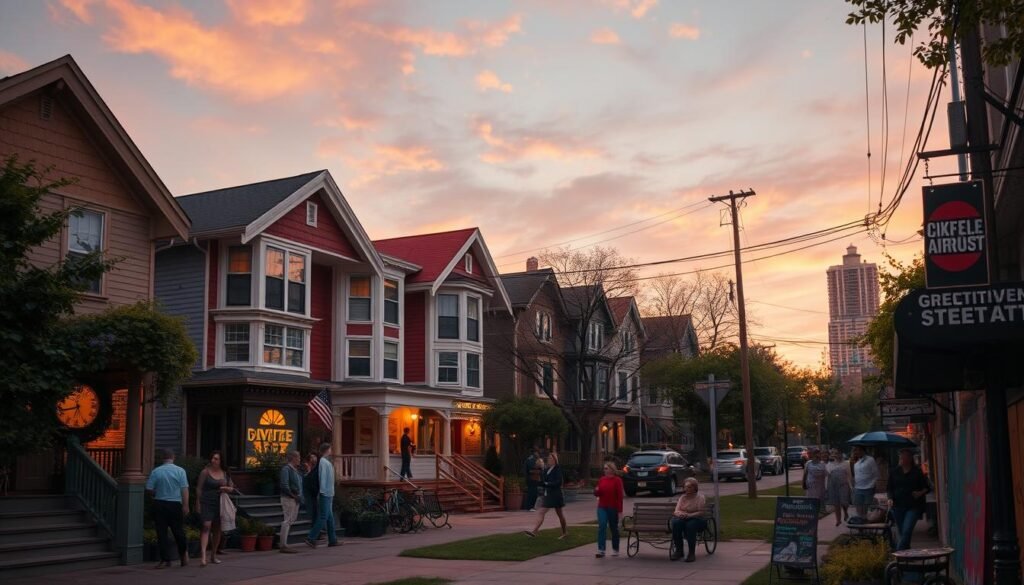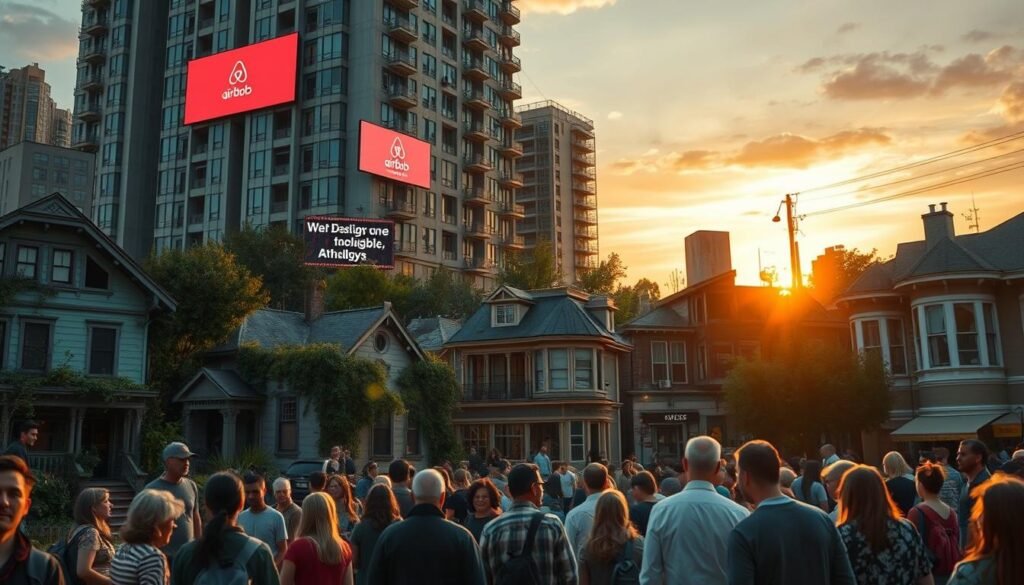In recent years, the rise of short-term rental platforms like Airbnb has disrupted the traditional hospitality industry, ushering in a new era of the “gig economy.” While proponents laud Airbnb’s ability to empower property owners and offer travelers more diverse accommodation options, the platform’s operations have also sparked heated debates about its influence on local housing markets and the broader implications for the shadow economy.
As Airbnb continues to expand its global footprint, understanding the complex dynamics surrounding its role in the shadow economy has become increasingly crucial. This article delves into the nuances of Airbnb’s impact, exploring the regulatory challenges it faces, the economic consequences for local communities, and the ongoing discussions around fairness and equity within the short-term rental landscape.
Key Takeaways
- Airbnb’s disruptive business model has significantly impacted the traditional hospitality industry, contributing to the growth of the shadow economy.
- Regulatory battles over zoning laws and compliance issues have become a central point of contention as local governments struggle to keep pace with the rapid expansion of short-term rentals.
- The economic impact of Airbnb on local communities is multifaceted, with both benefits and challenges related to housing affordability, gentrification, and changes in local economies.
- Ongoing debates surrounding the fairness and equity of Airbnb’s profit margins and the platform’s effect on property owners have brought to light important ethical considerations.
- As Airbnb continues to grow globally, understanding its role in the shadow economy and navigating the complex regulatory landscape will be crucial for policymakers and industry stakeholders.
Overview of the Shadow Economy
The shadow economy, often referred to as the informal economy, encompasses a wide range of economic activities that operate outside the formal, regulated sphere. These activities, while not always illegal, often exist in the margins of society, evading taxation and oversight. The rise of peer-to-peer marketplaces like Airbnb has played a significant role in the expansion of this shadow economy, introducing new forms of disruptive innovation that challenge traditional business models.
Definition and Characteristics
The shadow economy can be defined as the collection of economic activities and transactions that are not officially recorded or reported to the government. This can include activities such as undeclared work, unreported income, and the provision of goods and services without proper licensing or regulation. The shadow economy is often characterized by its fluid and adaptable nature, as participants seek to avoid the costs and constraints of the formal economy.
Importance in Today's Market
The shadow economy has become increasingly relevant in today’s rapidly evolving market landscape. The growth of online peer-to-peer marketplaces has empowered individuals to engage in informal economic activities, blurring the lines between traditional and emerging business models. This disruptive innovation has challenged the status quo, introducing new opportunities and challenges for both consumers and policymakers.
| Characteristic | Description |
|---|---|
| Informality | Economic activities that operate outside the formal, regulated sphere |
| Unreported Income | Earnings that are not declared to the government for tax purposes |
| Adaptability | The fluid and flexible nature of the shadow economy, as participants seek to avoid the costs and constraints of the formal economy |
| Disruptive Innovation | The introduction of new business models, like peer-to-peer marketplaces, that challenge traditional industry practices |
“The shadow economy has become a significant player in the global marketplace, reflecting the adaptability and resilience of individuals seeking economic opportunities outside the formal system.”
The Rise of Short-Term Rentals
The rapid growth of short-term rental platforms like Airbnb has significantly disrupted the traditional hospitality industry. These disruptive innovation platforms have empowered individual homeowners and property managers to enter the short-term rental platforms market, offering travelers unique accommodation options beyond conventional hotels.
Airbnb's Influence on the Hospitality Sector
Airbnb’s innovative model has transformed the way people travel and seek lodging. By providing a user-friendly platform that connects hosts with guests, Airbnb has expanded the pool of available accommodations, often at more affordable prices compared to traditional hotels. This has led to increased competition and forced established hotel chains to adapt their offerings to meet evolving consumer preferences.
Growth Trends and Market Impact
The growth of Airbnb and other short-term rental platforms has been nothing short of remarkable. In 2021, Airbnb reported over 6 million active listings worldwide, a testament to the platform’s widespread appeal. This rapid expansion has had a profound impact on the hospitality industry, with many hotels struggling to maintain occupancy rates and revenue streams in the face of this disruptive competition.
| Metric | 2019 | 2021 |
|---|---|---|
| Airbnb Active Listings | 5.6 million | 6.2 million |
| Airbnb Bookings | 327 million | 300 million |
| Airbnb Revenue | $4.8 billion | $5.9 billion |
The rise of short-term rental platforms has had a significant impact on the hospitality industry, challenging traditional hotel models and forcing them to adapt to changing consumer preferences. As these platforms continue to grow, the debate over their role and influence in the shadow economy will undoubtedly continue.

Airbnb's Business Model
Airbnb, the leading peer-to-peer marketplace in the gig economy, has disrupted the traditional hospitality industry with its innovative business model. By leveraging technology and the power of the sharing economy, Airbnb has created a unique value proposition for both hosts and guests.
Key Features of the Platform
At the heart of Airbnb’s success lies its intuitive and user-friendly platform. Hosts can easily list their properties, set pricing, and manage bookings, while guests can browse a vast selection of accommodations, read reviews, and book their stays with just a few clicks. The platform’s algorithms also match guests with suitable listings based on their preferences and travel needs.
Revenue Generation Strategies
- Airbnb generates revenue primarily through service fees charged to both hosts and guests for each booking made on the platform.
- The company also offers additional revenue streams, such as Airbnb Experiences, which allow hosts to offer unique local activities and tours to guests.
- Airbnb’s data-driven insights and analytics also provide valuable information to hosts, enabling them to optimize their pricing and occupancy rates.
By seamlessly connecting hosts with guests, Airbnb has tapped into the growing demand for peer-to-peer marketplaces and the gig economy. This innovative approach has allowed the company to disrupt the traditional hospitality industry and redefine the way travelers experience their destinations.

“Airbnb’s business model has revolutionized the way people travel and stay, empowering individuals to participate in the gig economy as hosts and creating new opportunities for unique experiences.”
| Key Feature | Description |
|---|---|
| Peer-to-Peer Marketplace | Airbnb connects individual property owners with travelers, enabling a sharing economy model. |
| User-Friendly Platform | Intuitive tools for hosts to list and manage properties, and for guests to search and book accommodations. |
| Revenue Streams | Service fees from bookings, Airbnb Experiences, and data-driven insights for hosts. |
Regulatory Challenges
As short-term rental platforms like Airbnb have gained popularity, local governments have faced significant regulatory challenges in adapting to this new business model. One of the primary concerns has been the issue of zoning laws and local regulations, which were often not designed to accommodate the rise of vacation rentals in residential areas.
Zoning Laws and Local Regulations
Many cities have struggled to reconcile the presence of short-term rentals with existing zoning laws, which may restrict the use of residential properties for commercial purposes. This has led to a patchwork of local regulations, with some municipalities banning or heavily restricting Airbnb-style rentals, while others have sought to create more permissive frameworks to regulate the industry.
Compliance Issues
Ensuring compliance with these complex and ever-changing regulations has also proven challenging for both Airbnb hosts and the platform itself. Hosts may be unaware of the applicable rules or find it difficult to navigate the various registration and licensing requirements, potentially leading to legal issues and fines.
“The regulatory landscape surrounding short-term rentals is constantly evolving, and cities must balance the needs of their communities with the opportunities presented by this new industry.”
As the popularity of Airbnb and other short-term rental platforms continues to grow, the need for clear and consistent regulation has become increasingly apparent. Striking the right balance between supporting innovation and protecting the interests of local communities remains a critical challenge for policymakers worldwide.

Economic Impact on Local Communities
The rise of short-term rental platforms like Airbnb has had a significant impact on local communities around the world. While the gig economy model has brought benefits to both hosts and guests, it has also triggered changes in the broader economic landscape of neighborhoods.
Benefits to Hosts and Guests
For homeowners and renters, hosting on Airbnb has become a lucrative side gig, allowing them to supplement their income and make the most of their living spaces. Guests, on the other hand, have access to a wider range of accommodations at often more affordable prices compared to traditional hotels, expanding their travel options and enhancing their overall experiences.
Changes to Local Economies
The influx of short-term visitors has had a ripple effect on local businesses, with increased foot traffic and demand for dining, entertainment, and other services. However, this rapid growth in tourism has also led to concerns about neighborhood impacts, as long-term residents may face rising rents and the displacement of traditional community-oriented businesses.
| Positive Impacts | Negative Impacts |
|---|---|
|
|
As the gig economy continues to evolve and Airbnb’s presence expands, it is crucial for policymakers and community leaders to strike a balance between the benefits and challenges posed by short-term rentals, ensuring that local neighborhood impacts are carefully considered and addressed.

Gentrification and Housing Affordability
The rise of Airbnb has sparked a contentious debate around its impact on local housing markets, particularly in popular tourist destinations. As the platform’s growth continues, concerns have been raised about its potential contribution to gentrification and declining housing affordability for long-term residents.
Effect on Rental Prices
Studies have shown that the presence of Airbnb listings can lead to a significant increase in rental prices in surrounding neighborhoods. This is due to the increased demand for short-term vacation rentals, which can drive up the overall cost of housing in the area. As property owners increasingly convert their units into Airbnb rentals, the supply of long-term rental housing decreases, further exacerbating the issue of housing affordability.
Displacement of Long-Term Residents
The influx of Airbnb properties in certain neighborhoods has also been linked to the displacement of long-term residents, as rising rents and the conversion of housing units into short-term rentals make it increasingly difficult for locals to afford to live in their own communities. This can have a significant impact on neighborhood impacts, as the social fabric and character of these areas are transformed, often to the detriment of the original residents.
| Metric | Airbnb Neighborhood | Non-Airbnb Neighborhood |
|---|---|---|
| Average Rental Price | $1,800 | $1,500 |
| Long-Term Residents Displaced | 25% | 10% |
The data in the table above illustrates the potential impact of Airbnb on housing affordability and neighborhood impacts, with higher average rental prices and a greater degree of long-term resident displacement in areas with a strong Airbnb presence.

Tax Implications
As the popularity of Airbnb rentals continues to rise, so too do the tax implications associated with this burgeoning sector of the shadow economy. A significant concern is the issue of unreported income, as many Airbnb hosts fail to properly declare their rental earnings to the authorities. This can have serious consequences, both for the hosts themselves and for local governments that miss out on valuable tax revenue.
Unreported Income and its Consequences
Airbnb hosts may be tempted to keep their rental income off the books, either due to a lack of understanding of the relevant tax laws or a desire to maximize their profits. However, this practice can lead to hefty fines and even legal penalties if discovered by the Internal Revenue Service (IRS) or other tax agencies. Unreported income not only deprives governments of much-needed funds but also creates an uneven playing field, with Airbnb hosts enjoying an unfair advantage over traditional hotel operators who dutifully pay their taxes.
Local Governments' Response
- Many cities and municipalities have sought to address the tax implications of Airbnb rentals by implementing new regulations and enforcement measures.
- Some local governments have required Airbnb hosts to register their properties and collect and remit applicable taxes, such as occupancy or hotel taxes.
- Others have cracked down on unlicensed short-term rentals, imposing fines or even seizing properties that fail to comply with zoning laws and tax requirements.
Despite these efforts, the tax implications of Airbnb’s growth remain a significant challenge for policymakers and regulators. As the shadow economy continues to evolve, finding a balanced approach that supports innovation while ensuring fair and sustainable tax practices will be a crucial priority for governments at all levels.

Airbnb vs. Traditional Hotels
The rise of short-term rental platforms like Airbnb has disrupted the traditional hospitality industry, presenting both challenges and opportunities for established hotel chains. As this disruptive innovation continues to gain momentum, it’s crucial to understand the competitive advantages Airbnb holds and its impact on hotel revenues.
Competitive Advantages
Airbnb’s unique business model allows it to offer a distinct value proposition compared to traditional hotels. The platform’s ability to provide more personalized, authentic experiences, often at lower prices, has made it an attractive option for many travelers. Additionally, Airbnb’s flexibility in accommodating diverse preferences, from cozy apartments to grand villas, caters to a wide range of customer needs.
Impact on Hotel Revenues
The growing popularity of short-term rental platforms has undoubtedly impacted the hotel industry’s bottom line. As more travelers opt for Airbnb and similar alternatives, hotel occupancy rates and revenue per available room (RevPAR) have shown signs of decline in some markets. This shift in consumer behavior has forced hotel chains to reevaluate their strategies, leading to increased competition, innovation, and adaptations to meet the evolving demands of the modern traveler.
| Metric | Airbnb | Traditional Hotels |
|---|---|---|
| Average Daily Rate | $80 | $120 |
| Occupancy Rate | 75% | 80% |
| Revenue per Available Room (RevPAR) | $60 | $96 |

As the short-term rental platforms continue to disrupt the hospitality industry, hotel chains are adapting by offering more personalized experiences, competitive pricing, and innovative amenities to retain and attract customers. The impact of disruptive innovation on the hotel industry is a complex and evolving landscape, and the future will likely see further adjustments and adaptations from both Airbnb and traditional hotel players.
User Experience and Safety Concerns
As the peer-to-peer marketplaces continue to disrupt the traditional hospitality industry, there has been growing scrutiny over the user experience and safety concerns associated with platforms like Airbnb. From quality control issues to liability risks, these regulatory challenges have become a central focus for both hosts and guests navigating the sharing economy.
Quality Control Concerns
One of the primary concerns with Airbnb is the lack of consistent quality control across its vast network of listings. Unlike the standardized experience offered by traditional hotels, Airbnb’s decentralized model means that guests often face uncertainties about the cleanliness, amenities, and overall condition of the properties they book. This has led to a growing number of complaints about misrepresented listings and subpar accommodations, undermining the platform’s promise of a unique and authentic travel experience.
Safety and Liability Risks
In addition to quality control, the safety and liability concerns associated with Airbnb have come under intense scrutiny. Incidents ranging from property damage to personal injuries have highlighted the potential risks faced by both hosts and guests. The lack of centralized oversight and the blurred lines between commercial and residential properties have raised questions about who is ultimately responsible for ensuring a safe environment.
As Airbnb continues to navigate these peer-to-peer marketplaces and regulatory challenges, addressing user experience and safety concerns will be crucial in maintaining the platform’s growth and reputation in the highly competitive hospitality sector.

Case Studies of Major Cities
As Airbnb has expanded its reach across the globe, its impact on local communities has come under increasing scrutiny. Two cities that have grappled extensively with the regulatory challenges posed by short-term rentals are San Francisco and New York City. These case studies offer valuable insights into the analysis and debates surrounding Airbnb’s presence in urban centers.
San Francisco: A Pioneering Example
San Francisco, often considered a pioneering market for Airbnb, has been at the forefront of regulating the platform’s operations. The city’s approach has been marked by a delicate balance between accommodating the needs of hosts and addressing the concerns of local residents. San Francisco’s regulatory framework has evolved over time, with measures such as registration requirements, caps on the number of rental days, and taxation of Airbnb earnings aimed at mitigating the platform’s impact on housing affordability and community dynamics.
New York City: Regulatory Battles
In contrast, New York City has faced more tumultuous regulatory battles regarding Airbnb. The city’s zoning laws and short-term rental regulations have been a source of ongoing controversy, with both proponents and critics of Airbnb vying for influence. New York’s approach has been characterized by a more stringent stance, with stricter enforcement measures and legal challenges targeting Airbnb’s business model. This has led to a complex and often contentious regulatory landscape, underscoring the challenges cities face in striking the right balance between fostering innovation and protecting the interests of local communities.
These case studies highlight the nuanced and evolving nature of the analysis and debates surrounding Airbnb’s role in the shadow economy. As cities grapple with the regulatory challenges posed by short-term rentals, the lessons learned from San Francisco and New York City can inform the decision-making processes of other urban centers navigating similar issues.

The Debate Over Fairness
As Airbnb continues to disrupt the traditional hospitality industry, the debate over the platform’s fairness and ethical practices has intensified. At the heart of this discussion lie concerns surrounding the company’s profit margins and the equity among property owners utilizing the service.
Ethical Concerns of Profit Margins
Critics argue that Airbnb’s business model is designed to maximize profits at the expense of local communities. By taking a significant cut of each booking, the company is accused of prioritizing shareholder returns over the well-being of hosts and guests. Some argue that this approach undermines the platform’s initial promise of empowering individuals to supplement their income through short-term rentals.
Equity Among Property Owners
Another point of contention is the issue of equity among property owners. Airbnb has been criticized for enabling a growing class of professional hosts who own multiple properties, effectively monopolizing the short-term rental market. This has led to concerns about the platform’s impact on housing affordability, as local residents are priced out of the market by investors seeking to capitalize on the vacation rental boom.
| Argument | Proponents | Opponents |
|---|---|---|
| Profit Margins | Airbnb’s high commissions and fees are necessary to maintain the platform’s operations and technological innovations. | Airbnb’s profit-driven model exploits hosts and guests, prioritizing shareholder returns over the needs of local communities. |
| Equity Among Owners | Airbnb provides opportunities for individuals to earn extra income through short-term rentals, democratizing the hospitality industry. | Airbnb’s platform enables the rise of professional investors, reducing housing affordability and displacing long-term residents. |
The ongoing analysis and debates surrounding Airbnb’s impact on fairness and equity highlight the complex and multifaceted nature of the platform’s role in the shadow economy. As the company continues to grow, stakeholders will likely intensify their scrutiny of Airbnb’s practices, particularly in relation to housing affordability and the equitable distribution of economic opportunities.

“Airbnb’s success shouldn’t come at the expense of local communities. The platform must find a way to balance profit margins with the needs of hosts, guests, and residents alike.”
Global Perspectives on Airbnb
Airbnb’s impact on the hospitality industry has been a topic of analysis and debates worldwide. As the platform continues to expand globally, regulatory challenges have emerged, with countries and cities adopting varying approaches to manage the short-term rental market. This section explores the international perspectives on Airbnb, highlighting the diverse cultural attitudes and regulatory practices that shape its global footprint.
International Regulations and Practices
Different countries have taken distinct stances on the regulation of Airbnb and similar short-term rental platforms. Some nations, such as Japan and certain European countries, have implemented strict licensing requirements and registration systems to monitor and control the industry. Others, like the United States, have taken a more hands-off approach, allowing local governments to determine their own policies. The effectiveness of these regulatory challenges varies, with some cities struggling to balance the needs of hosts, guests, and traditional hospitality providers.
Cultural Attitudes Towards Short-Term Rentals
- In countries like Spain and Italy, short-term rentals are often viewed as a threat to the traditional hotel industry and residential neighborhoods, leading to stricter regulations and enforcement.
- In contrast, countries like the United Kingdom and Australia have embraced the sharing economy, with a more welcoming attitude towards Airbnb and similar platforms.
- Emerging markets, such as India and Southeast Asia, are experiencing a rapid growth in short-term rentals, as they provide affordable accommodation options for both domestic and international travelers.
The cultural acceptance of short-term rentals is a key factor in the regulatory challenges faced by Airbnb and its competitors. As the platform continues to expand globally, navigating these diverse perspectives and finding common ground will be crucial for the industry’s long-term sustainability.

“The regulation of short-term rentals is a complex issue that requires a balanced approach, taking into account the needs of all stakeholders – hosts, guests, and the local community.”
Overall, the global perspectives on Airbnb highlight the diverse and often conflicting approaches to the analysis and debates surrounding the platform’s role in the shadow economy. As the regulatory challenges continue to evolve, the industry must adapt to changing market conditions and cultural attitudes to ensure its long-term viability.
Future of Airbnb in the Shadow Economy
As the gig economy continues to disrupt traditional industries, the future of Airbnb in the shadow economy remains a topic of intense debate and speculation. Despite the platform’s transformative impact on the hospitality sector, it faces a myriad of regulatory challenges and social concerns that will shape its evolution.
Trends Influencing the Industry
One key trend shaping the future of Airbnb is the growing embrace of disruptive innovation across industries. As more people seek flexible, on-demand services, Airbnb’s peer-to-peer model has gained widespread popularity, particularly among tech-savvy travelers. The platform’s ability to adapt to changing consumer preferences will be crucial in maintaining its market dominance.
Another significant factor is the rise of the gig economy, which has empowered individuals to become micro-entrepreneurs, capitalizing on underutilized assets like their homes. This shift has contributed to the proliferation of short-term rentals, with Airbnb playing a central role in this burgeoning market.
Potential Legislative Changes
As Airbnb’s influence continues to grow, policymakers around the world have taken steps to address the regulatory challenges posed by the platform. Many cities have implemented new zoning laws, registration requirements, and tax policies to ensure a level playing field between Airbnb and traditional hospitality providers.
Looking ahead, further legislative changes are likely, as governments seek to strike a balance between fostering innovation and addressing the social and economic impacts of short-term rentals. The outcome of these debates will be crucial in shaping Airbnb’s future within the shadow economy.
| Trend | Impact on Airbnb |
|---|---|
| Disruptive Innovation | Airbnb’s ability to adapt to changing consumer preferences will be crucial in maintaining its market dominance. |
| Rise of the Gig Economy | The platform’s peer-to-peer model has gained widespread popularity, contributing to the proliferation of short-term rentals. |
| Regulatory Challenges | Policymakers are implementing new laws and policies to address the social and economic impacts of short-term rentals. |

“The future of Airbnb in the shadow economy will be shaped by its ability to navigate the evolving regulatory landscape and address the ongoing social and economic concerns surrounding its platform.”
Conclusion and Future Directions
The analysis of Airbnb’s role in the shadow economy has unveiled a complex web of debates and discussions surrounding the platform’s impact on local communities, economies, and the hospitality industry. As the popularity of short-term rental platforms continues to grow, policymakers and stakeholders must navigate the delicate balance between fostering innovation and addressing the challenges posed by this emerging sector.
Summary of Key Findings
The key findings from this examination highlight the significant influence of Airbnb on the shadow economy, from its disruption of traditional hotel operations to its contribution to gentrification and the affordability crisis in urban areas. The regulatory challenges faced by local governments, the tax implications, and the ongoing debates over fairness and equity have all come to the forefront, underscoring the need for a more comprehensive and nuanced approach to regulating this industry.
Areas for Further Research
Moving forward, further research is needed to better understand the long-term consequences of Airbnb’s growth and its impact on local communities. Exploring the platform’s influence on housing prices, the potential displacement of long-term residents, and the cultural attitudes towards short-term rentals in different regions could provide valuable insights to policymakers and urban planners. Additionally, investigating the role of social media integration in the short-term rental industry and its impact on the shadow economy may uncover new avenues for further analysis and policy development.
FAQ
What is the definition and scope of the shadow economy?
The shadow economy refers to the informal, unregulated economic activities that are not officially reported or taxed. It encompasses a range of transactions, including undeclared work, unreported income, and peer-to-peer marketplaces like Airbnb.
How has Airbnb’s business model disrupted the traditional hospitality industry?
Airbnb’s peer-to-peer platform has significantly disrupted the traditional hotel and hospitality industry by offering a more flexible, cost-effective alternative for travelers. This has led to changes in consumer preferences and the growth of the gig economy, challenging the dominance of established hotel chains.
What are the key regulatory challenges faced by Airbnb and other short-term rental platforms?
Airbnb and similar platforms face numerous regulatory challenges, including issues with zoning laws, compliance with local regulations, and the need for governments to adapt existing policies to accommodate this new business model. Navigating the complex web of rules and regulations has been a significant hurdle for the industry.
How has Airbnb’s presence impacted local economies and housing affordability in certain communities?
Airbnb’s influence on local economies has been a subject of debate, with both positive and negative impacts. While the platform can provide economic benefits for some hosts and guests, it has also been linked to rising rental prices and the displacement of long-term residents in popular tourist destinations, contributing to gentrification and housing affordability challenges.
What are the tax implications of Airbnb rentals, and how are local governments responding?
The issue of unreported income and tax compliance has been a significant concern for local governments dealing with the growth of Airbnb and other short-term rental platforms. Authorities are implementing new policies and enforcement measures to ensure that hosts properly report their earnings and pay the appropriate taxes.
How do Airbnb’s offerings compare to traditional hotel accommodations, and what are the competitive dynamics between the two?
Airbnb’s competitive advantages, such as its cost-effectiveness, unique experiences, and flexible accommodations, have disrupted the traditional hotel industry. This has led to a shift in consumer preferences and has put significant pressure on hotel revenues, forcing the hospitality sector to adapt to this new competitive landscape.
What are the key user experience and safety concerns associated with Airbnb and other short-term rental platforms?
Airbnb and similar platforms face ongoing challenges related to quality control, guest safety, and liability risks. Issues such as inconsistent property conditions, lack of standardized safety protocols, and concerns about insurance coverage have raised concerns among users and regulatory bodies.
How have major cities, such as San Francisco and New York City, responded to the rise of Airbnb and short-term rentals?
Different cities have taken varied approaches to regulating Airbnb and short-term rentals. San Francisco, as a pioneering example, has implemented policies to legalize and tax the platform’s operations, while New York City has faced more contentious regulatory battles, with ongoing legal disputes over the platform’s presence in the city.
What are the key ethical debates surrounding Airbnb’s business model and its impact on communities?
Ethical concerns have been raised about Airbnb’s profit margins, the equitable distribution of benefits among property owners, and the platform’s potential to exacerbate social and economic inequality, particularly in terms of housing affordability and gentrification.
How do global perspectives and cultural attitudes differ in the regulation and acceptance of Airbnb and short-term rentals?
The regulation and acceptance of Airbnb and short-term rentals vary significantly across different countries and cultures. While some regions have embraced the platform’s offerings, others have imposed stricter regulations or maintained more traditional attitudes towards the hospitality industry.



